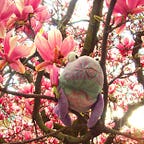Sahra Halgan Trio: Faransiskiyo Somaliland
“Halgan” means “combatant,” an unofficial title the Somaliland independence movement bestowed on this singer who moonlighted as a Red Cross nurse during the bombardment of the north by Mogadishu-led forces. After a couple of decades in Lyon, she returned to unrecognized capital and longtime arts hotbed Hargeisa to run some kind of studio (and star in a documentary, as one does.) Rather than the sparseness of the Horn’s traditional music, her time abroad and her French backing band have produced songs recognizable as such accompanied by guitar, drums, and sometimes double-bass. The sound falls within what we Westerners call desert blues, with Halgan’s wobbling around the notes singing parallelling Arabic microtonality. Exploring the folkloric feel that takes hold on the voices-and-claps final track would make for an intriguing follow-up.
Grade: A MINUS (“Guntana”, “Somaliland”, “Naftaydaay Raali Noqo”)
Steve Lehman: Sélébéyone
The rapping in Wolof is surer than the rapping in English and the alto saxman is more substantial than the soprano saxman, though the latter is to be expected when said alto is Steve Lehman. What keeps the record consistently entertaining is the drums — I don’t know what’s Damion Reid and what’s programming, but it all clatters agreeably to keep the material pulsing even when the supports are center stage. It’s not all go-go: there are quiet moments where the instrumentalists provide atmosphere while the vocalists spit, and if the lyrics again favor Wolof, HPrizm allows no drop-off in attitude. Get the MacArthur people to bankroll a Kendrick guest spot and kids might start listening to good jazz again.
Grade: A MINUS (“Cognition”, “Laamb”, “Bamba”)
Dengue Fever: The Deepest Lake (2015)
On their sixth album, the Californian-cum-Cambodian sextet finds yet more ways to remake Odessey and Oracle. Their balance has improved over the years — the Farfisa no longer overwhelms, so you can hear how fat David Ralicke’s sax tone has become. The most English-friendly track is “Rom Say Sok”, about a Khmer woman who dehydrated a pursuing crocodile by soaking up a lake with her hair and who may or may not also a be modern bouffanted woman who rides around jumping over things on her motorcycle. What is this, an Apichatpong Weerasethakul movie? (Answer: Yes, and as the band name suggests, it’s “Tropical Malady.”)
Grade: A MINUS (“Rom Say Sok”, “Still Waters Run Deep”, “Deepest Lake on the Planet”)
Rodrigo Campos: Conversas Com Toshiro (2015)
The writer of a couple of songs on Elza Soares’ The Woman at the End of the World constructs a concept album about Japanese popular culture, plus Wong Kar-Wai for some reason. I had to Google the non-cinema references, so I’m not completely sure whether, for instance, “Funatsu” refers to the creator of a softcore porn recipe manga. A few tracks rumble with momentum, but for the most part the music is genteel, so that without translations you might not suspect he’s singing about Fukushima or having your lover cut your torso open during sex. That aside, pleasant.
Grade: B PLUS (“Wong Kar Wai”, “Toshiro Reverso”, “Takeshi e Asayo”)
Alex Anwandter: Amiga
Woke Chilean dance-pop leading to a woker torch “Manifiesto,” and while it might be worth stopping the groove dead to declare his proud genderfluidity, it’s not worth killing it again four songs later to cry over an insufficiently anti-capitalist friend no matter how much I might sympathize with Anwandter’s side of the dialectic. Most of the rest is good though: if the lead single has a few too many rote EDM elements, elsewhere rehydrated disco, retro drum machines, and the “Be My Baby” intro all fulfill their archetypal roles.
Grade: B PLUS (“Cordillera”, “Amiga”, “El Sonido De Los Corazones Que Se Quiebran”)
